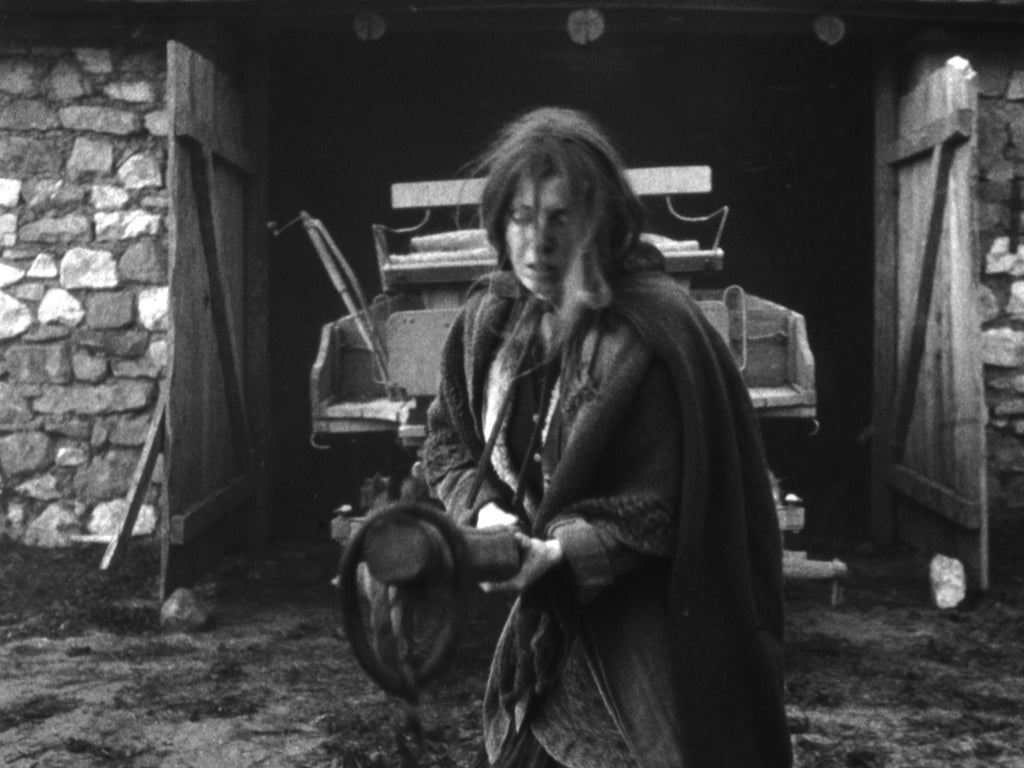The Turin Horse, Bela Tarr, 146 mins (15)
A stubborn horse presages doom in this distillation of Bela Tarr's ascetic aesthetic (hint: not much happens, and little is said)

The films of the Hungarian auteur Bela Tarr often feature scenes in which characters struggle doggedly across vast windswept plains. Some might say that to watch a Bela Tarr film is to struggle across a windswept plain. Even if you're accustomed to cinematic austerity, Tarr's glacier pacing can test the concentration – especially when, as in the case of his labyrinthine, multi-layered, mesmerically strange Satantango, a film lasts for over seven hours.
By that yardstick, The Turin Horse, at a mere 146 minutes, ought to feel like a light, jaunty canter. Yet in some ways, it's the most extreme of Tarr's films – and certainly the simplest. Co-written, once again, by novelist Laszlo Krasznahorkai, The Turin Horse is a minimalist distillation of Tarr's cinema: little more than a man, a woman, a horse, a house, some wretched weather, and very few words. The narrative content is so slender that it's barely even an anecdote, yet the film has the disturbing resonance of some ancient imponderable fable.
It all begins in darkness, as a narrator intones the apocryphal tale of how Nietzsche went mad – supposedly after seeing a horse beaten in Turin. After this incident, the German philosopher lapsed forever more into silence. The punchline: "No one knows what happened to the horse".
Thereafter, it's as if the film – indeed, the whole world – turns to near-silence. The story is told with few words but strong images, shot in long, sinuously executed takes. A grizzled carter (Janos Derzsi) returns to his austerely furnished farmhouse; he puts his horse in its stable and joins his daughter (Erika Bok) for their daily meal of boiled potatoes washed down with brandy. The next day, they harness the horse – but the beast refuses to move. And then refuses to eat. It refuses, in fact, to do anything that will help its owners earn their living, just stands dumbly in its stall. This is the Bartleby of horses – the equine equivalent of the clerk in Herman Melville's story who, when asked to do anything, would politely reply, "I would prefer not to."
The old man and his daughter reconcile themselves to the horse's radical non-cooperation. They get up, dress, sit patiently staring at the wind-lashed heath outside their house, eat their spuds and eventually go back to bed. They subsist, as taciturnly and as tenaciously as Beckett characters enduring the world from their dustpiles. Sometimes a laconic comment is made to the effect that the world is winding down: the carter points out that the house's woodworms can no longer be heard going about their business. "I've heard them for 58 years – they've stopped doing it." It's as if even the world's decay has downed tools and given up.
Occasionally, something approaching incident takes place. A neighbour drops by and launches into a torrent of lamentation about how "they" – whoever "they" are – are causing it all to go to hell in a handbasket. Then a wagonload of noisy gypsies bowl in, invite the daughter to come with them to America, and help themselves to water from the house's well – before being seen off unceremoniously.
Maybe it's as a direct result of this episode that the well dries up, but we can't tell whether cause and effect even apply in this world. It's hard to know anything for sure: strictly speaking, we can't even be certain that this particular horse (played by a sorry-looking candidate for the gluepot named Ricsi) is meant to be the horse in the Nietzsche story. This is a film of uncertainties – and because there's nothing solid to grasp in the narrative, what we cling to is the texture of the film itself. We become attentive to the ritualistic repetition of actions, to the prowling camera moves that map out the contours of this enclosed but oddly elastic universe, and to the eerie sound design – along with Mihaly Vig's creaky, dirge-like violin/organ score, a ghastly three-note refrain has been mixed eerily into the sound of the wind itself, not just hauntingly but fit to drive you mad.
As with all Tarr's films, the images have a terrible, chill beauty: take the shot near the end where we see the daughter gazing out of the window of the house, framed there like a ghost who's been trapped for all eternity; or the extraordinary close-up of the horse's head that hangs inertly swaying, like a baleful living skull, or the very spirit of inertia.
Shot in ascetically beautiful black and white by Fred Kelemen, this could almost be a documentary about 19th-century peasant life at its most challenging. (In fact, it's a world only one step of luxury up from prehistoric cave living.). But there's a mysterious metaphysical resonance about The Turin Horse that makes for the enigmatic numinousness of a Kafka parable. This is cinema so spare and silent it's on the verge of being Trappist cinema – and that is eloquence indeed.
Join our commenting forum
Join thought-provoking conversations, follow other Independent readers and see their replies
Comments